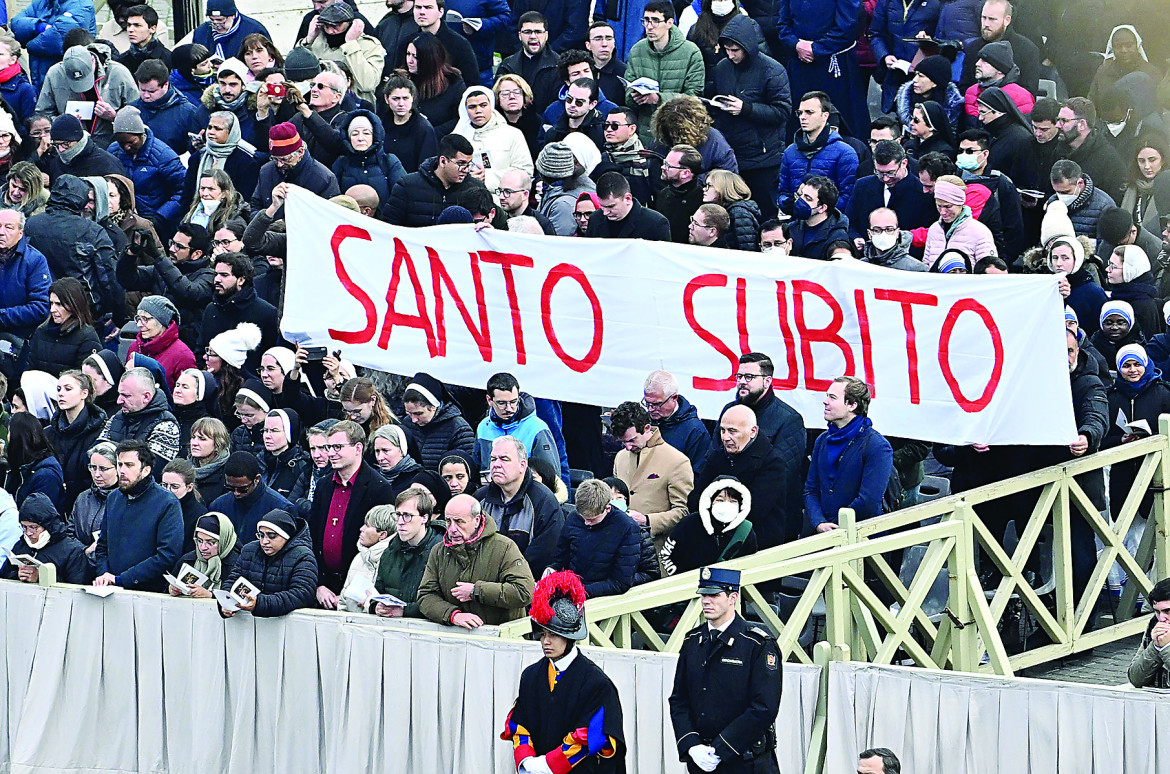Interview
The first global pope bids farewell to the last Eurocentric pope
For Benedict, Christianity found its fullest expression in Europe. For Francis, the world is an interconnected system. We spoke with historian Sante Lesti of the Scuola Normale Superiore in Pisa.

Since the end of World War II, the question of Europe’s Christian roots has become increasingly prominent among the Church’s magisterium. Pius XII was already saying that the new Europe under construction needed to be modeled on medieval Christendom. However, it was John Paul II who forcefully revived the theme and carried forward the teaching of his predecessors.
Pope Ratzinger also moved along the same trajectory. Already by choosing to call himself Benedict XVI (the name of the pope who had called World War I a “useless slaughter,” but also, perhaps most importantly, Europe’s first patron saint), he emphasized the centrality of the Old Continent in the program of his pontificate. However, there were some significant differences between the different pontiffs.
Historian Sante Lesti of the Scuola Normale Superiore in Pisa recently concluded a research project on the question of Europe’s Christian roots.
When and how did Ratzinger’s reflection on the Christian roots of the European continent take shape?
Beginning in the 1970s, Ratzinger began to conceive of Europe as a cultural, spiritual and not just geographical reality; as a meeting place between the God of Israel and classical Greek thought. In his view, Christianity was the synthesis that shaped the continent’s history. As prefect of the Congregation for the Doctrine of the Faith, he promoted the idea of the Christian roots of the continent, but also that of the European origins of Christianity, which, according to him, had achieved its highest form in Europe. In this way, he actually comes to stand for something like the supremacy of Latin-born Christianity over Eastern Christianity.
How does Benedict XVI’s conception of Europe differ from that of his predecessor?
One aspect seems to me to be the loosening of the link between the idea of Europe and that of the Europe of nations, which no longer have the same centrality for him that they had for Wojtyla. Moreover, while the Polish pope conceived of history in terms of divine providence, Benedict XVI approached it from a philosophical point of view: as the history of a civilization built on the encounter between faith and reason. Both of them believed that the departure of societies from the precepts of the Church represented the reason for their crisis, whether identitarian, cultural and geopolitical.
At a famous conference in Subiaco in 2005, a few weeks before his election to the papacy, Ratzinger argued that the controversy over the inclusion of Christian roots in the European Constitution represented the latest stage in the conflict between Christian culture and the Enlightenment. Right-wing think tanks also spoke up to support his view. What, then, were the political implications of the pope’s outlook?
On that occasion, Ratzinger asserted the need for Europe to recognize Christianity as the source of its orientation and the basis of its identity. However, in suggesting that Europeans should live “as if” God existed, the Pope in fact renounced the utopian prospect of a mass conversion of citizens and institutions to Christianity. In a sense, at that point he showed himself to be more “political” than his predecessor and more interested in seeking concrete ground from which to promote his view.
What about the “non-negotiable values” campaign? Why is it considered so important?
It is crucial because it allows the Pope to specify what the Holy See’s political priorities should be. Speaking at a conference sponsored by the EPP in 2006, he listed three of them: the “protection of life in all its phases” (the fight against contraception, abortion, assisted reproduction and euthanasia); the “promotion of the natural family” (the fight against equating homosexual unions with marriage); and “the protection of the right of parents to educate their children” (support for private Catholic schools). I would emphasize, however, that the principles related to Catholic biopolitics prevailed above all.
With the inauguration of Pope Francis, the Church’s agenda has changed. What consequences of this can be seen in his own way of talking about Europe?
Benedict XVI was the last Eurocentric pope; Bergoglio, on the other hand, is recognizing that the world is an interconnected system. However, it would be wrong to claim that the Holy See has abandoned its campaign for Christian roots. A rethinking is underway. Undoubtedly, priorities have changed, and the battle for non-negotiable principles is no longer the guiding star. Instead, in the pope’s speeches on Europe there is far more space given to welcoming migrants, social solidarity and environmental protection.
In 2016, on the occasion of the Charlemagne Prize, Pope Francis gave a speech that was groundbreaking in a number of ways. How did the reflection on the category of identity also change in this process?
In that speech, for the first time, Bergoglio rejected any exclusivist view of the idea of Europe. This meant that for the Pope, the culture of the continent no longer had a single root. For Francis, “the identity of Europe is, and always has been, a dynamic and multicultural identity.” In its contents, too, it was a radical speech: he attacked the “culture of waste” and challenged the individualism of the market. However, afterwards the Pope went back to proposing a more traditional vision. It will be up to the future of his pontificate, or to his successor, to choose which path to take.
Originally published at https://ilmanifesto.it/il-primo-papa-globale-dice-addio-allultimo-papa-eurocentrico on 2023-01-06
